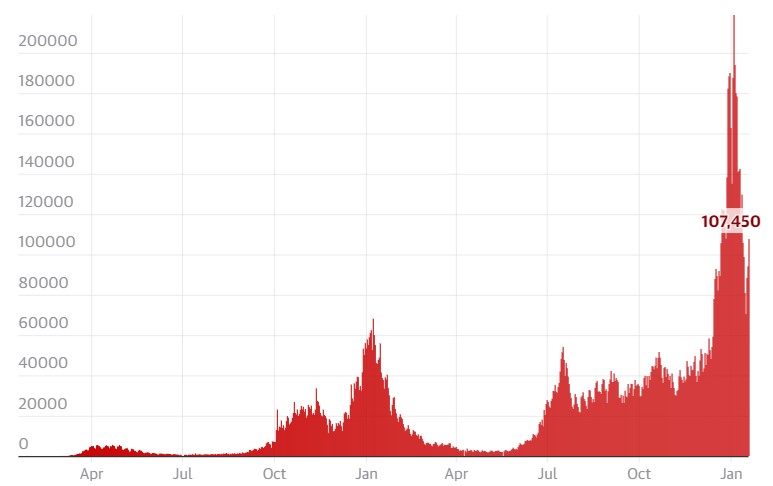As Omicron cases soared to a record-high in Britain, hitting more than 200,000 cases in late December and only recently dropping to around 140,000 incidences per day, Prime Minister Boris Johnson has announced the end of all COVID-19 safety measures.

This includes compulsory mask-wearing in public transport, shops, and schools, and the need for vaccine certification.
The Prime Minister declares to the House of Commons that the legal requirement for those infected with the coronavirus is to self-isolate for five to seven days will continue on to 24 March, though the expiry date of that mandate can be negotiated.
Justifications for the Call?
Judging from the studies done by researchers and scientists alike, they are seeing signals of the Omicron cases having peaked in both the UK and the United States, which means that the Omicron case numbers are bound to drop.
The Omicron variant has proven to be wildly contagious with its enhanced transmissibility, as seen in the fourth wave that has swept through Europe, China, and the US and its subsequent re-tightening of restrictions, but studies have unanimously shown that its symptoms are milder.
As a result, there is a higher incidence of infection, but the hospitalisation rates and death tolls have remained roughly the same.
Moreover, according to the former head of the British Vaccine Task Force Clive Dix, more than 90% of the British people have at least one dose of the vaccine, and more than 60% have been administered a booster shot.
Being vaccinated and bolstered by the booster does lower the possibility of infection, but not completely.

What is more worrying to some of the members on the parliament bench is that Johnson’s call for the end of COVID-19 restriction measures might be more of a political stunt than a public health-motivated one, since he had pledged to avoid lockdowns and shows zero tolerance towards the strict protocols China and Hong Kong are reinforcing.
Similarly, the conservative bench seemed pleased by the relaxation of the mask mandates.
Advocates are standing more for the “learn to live with the pandemic” as the new normal as opposed to constantly placing restrictions.
Rightful Concerns
In response to Prime Minister’s Johnson’s decision, Keir Starmer, representative of Labour, stated that he hopes that the restriction will no longer be necessary as long as science proves that its safe.
However, teaching unions are worried about the abrupt change, warning that they might witness widespread disruption in education due to COVID-19 outbreaks.
This was supported by Mary Bousted, the Joint General Secretary of the National Education Union who noted that while the infection trends among children are lower, schools have just returned back to their usual sessions. It is still difficult to say if the low trends will remain the same.
Changing the safety protocols instead would lead to uncertainty of whether there would be a pronounced risk of increased disruption with children and staff needing to self-isolate.
The Deputy Chief and representative of Nation Health Service Providers (NHS) concurs, cautioning that hospitals are already at their full capacity and combating the toughest and largest number of patients.
There is a reduction of cases, but they are still very high. The relaxation of measures might worsen the situation even further in the future.
Even the World Health Organisation (WHO) warns governments against treating the virus like a seasonal flu, because more variants are bound to mutate and occur as the European continent is being pummeled by Omicron cases.
The appearance of the IHU Variant from Cameroon to France backs up this claim.
Join our Telegram channel for more entertaining and informative articles at https://t.me/goodyfeedsg or download the Goody Feed app here: https://goodyfeed.com/app/
Truthfully speaking, with the likes of France and Spain taking extra cautionary measures, Britain becoming an outlier, no thanks to Boris Johnson, seems to be a bad idea in general.
Johnson’s track record stands against him too; he was once unfearful of COVID-19 when he stepped onto the main political stage, only to contract the virus himself in April 2020, such that he needed to be hospitalised in the Intensive Care Unit for three days.
And that’s not mentioning his general policy makings and the economic fallout that Brexit is causing, which he had once alleged to be a good thing to regain the United Kingdom’s sovereignty against the European Union.
Putting UK’s version of Donald Trump aside, Susan Hopkins, the Chief Medical Advisor of the United Kingdom’s Health Security Agency summarises the situation best:
She believes that the cases will continue to decline, though not linearly, and there might be plateaus for different populations and areas.
However, what will ultimately determine how fast the infection will spread will be the reaction of the general population after the removal of the safety protocols.
Will the general population continue to abide by those protocols now that they are government-enforced?
Read Also:
- M’sia Easing COVID-19 Rules for CNY & Lion Dances Are Allowed
- Hong Kong to Cull 2,000 Hamsters from 34 Shops After Some Tested Positive for COVID-19
- Scientists Found New COVID-19 Variant With ’46 Mutations’ in France
Featured Image: Shutterstock / Michael Tubi




